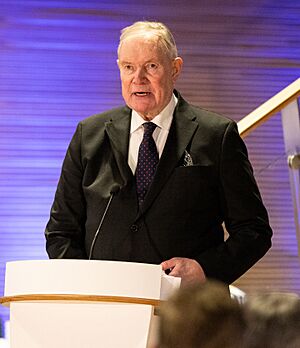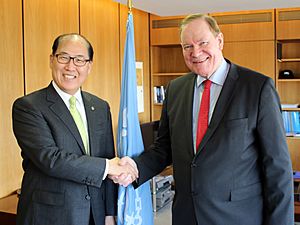Paavo Lipponen facts for kids
Quick facts for kids
Paavo Lipponen
|
|
|---|---|

Lipponen in 2023
|
|
| 38th Prime Minister of Finland | |
| In office 13 April 1995 – 17 April 2003 |
|
| President | Martti Ahtisaari Tarja Halonen |
| Deputy | Sauli Niinistö Ville Itälä |
| Preceded by | Esko Aho |
| Succeeded by | Anneli Jäätteenmäki |
| Speaker of the Finnish Parliament | |
| In office 22 April 2003 – 20 March 2007 |
|
| Preceded by | Liisa Jaakonsaari (Acting) |
| Succeeded by | Timo Kalli |
| In office 28 March 1995 – 19 April 1995 |
|
| Preceded by | Riitta Uosukainen |
| Succeeded by | Riitta Uosukainen |
| Personal details | |
| Born |
Paavo Tapio Lipponen
23 April 1941 Turtola, Finland |
| Political party | Social Democratic |
| Spouse | Päivi Lipponen (née Hiltunen) |
| Children | 3 |
| Alma mater | Dartmouth College University of Helsinki |
| Military service | |
| Allegiance | |
| Branch/service | |
| Rank | Staff sergeant |
Paavo Tapio Lipponen (born 23 April 1941) is a Finnish politician who served as the Prime Minister of Finland from 1995 to 2003. Before entering politics, he worked as a reporter.
As a leader, Lipponen was the chairman of the Social Democratic Party of Finland for 12 years, from 1993 to 2005. After his time as prime minister, he became the Speaker of the Parliament from 2003 to 2007. In 2012, he ran for president of Finland but was not successful. Today, he is the oldest living former prime minister of Finland.
Contents
Early Life and Education
Paavo Lipponen was born in Turtola, a town later renamed Pello, in Finland. He spent his childhood in the city of Kuopio.
After graduating from high school in 1959, he traveled to the United States to study at Dartmouth College for a year on a scholarship. When he returned to Finland, he moved to Helsinki. There, he earned a master's degree in international relations from the University of Helsinki in 1971.
During his university years, Lipponen was active in student life. He was the editor of a student newspaper from 1963 to 1965. He also worked as a reporter for YLE, Finland's national broadcasting company, from 1965 to 1967.
Political Career
Lipponen began working for the Social Democratic Party in 1967. He first gained public attention when he worked as a secretary for Prime Minister Mauno Koivisto from 1979 to 1982. Because he often had to step in for the busy prime minister, people started calling him vara-Manu, which means "deputy Manu" (Manu is short for Mauno).
Lipponen was a member of the Parliament of Finland from 1983 to 1987 and again from 1991 to 2007.
Becoming Prime Minister
In 1993, Lipponen was elected as the new chairman of the Social Democratic Party. He led his party to a big win in the 1995 parliamentary election. After the election, he became the Prime Minister of Finland.
He formed a government with five different political parties, a type of government called a "rainbow coalition." A major goal for his government was to lower unemployment. His government's economic policies helped Finland join the European Monetary Union, which led to the country adopting the euro as its currency in 1999.
Lipponen's first term as prime minister ended in 1999. In the election that year, his party lost some seats but remained the largest in parliament. He formed a second government that was similar to his first one. During this time, Finland held the presidency of the EU for six months.
The Iraq-gate Scandal
In the 2003 election, a major political debate arose. Anneli Jäätteenmäki, the leader of the Centre Party, accused Lipponen of secretly supporting the United States in the Iraq War. Lipponen denied this, saying that Finland supported the United Nations.
Jäätteenmäki's party won more seats, and she became the new prime minister. However, she had to resign after only 63 days. It was revealed that she had received secret documents about Lipponen's meeting with the U.S. president. This event became known as the Iraq leak or "Iraq-gate."
After Jäätteenmäki resigned, Lipponen became the Speaker of the Parliament. He retired from his role as party chairman in 2005 and left parliament in 2007.
Life After Politics
In 2008, Lipponen took a job as a consultant for Nord Stream 1, a company building a natural gas pipeline from Russia to Germany. His role was to advise on the project's environmental impact in Finland. This job caused some controversy because of his past political role.
Lipponen has also shared his opinions on important issues. In 2008, he wrote about Europe's need for different energy sources and warned against depending too much on Russian gas.
In 2012, he ran for president as the candidate for the Social Democratic Party. He received 6.7% of the vote and was not elected.
Personal Life
In his youth, Paavo Lipponen was a talented water polo player and competed at the national level.
He is married to his second wife, Päivi Lipponen, and they have three children.
Lipponen has been offered the title of Counselor of State, which is the highest honor in Finland. He declined it, saying he is happy just being known as a "former prime minister."
Cabinets
- Lipponen I Cabinet (1995–1999)
- Lipponen II Cabinet (1999–2003)
See also
 In Spanish: Paavo Lipponen para niños
In Spanish: Paavo Lipponen para niños
 | Roy Wilkins |
 | John Lewis |
 | Linda Carol Brown |


